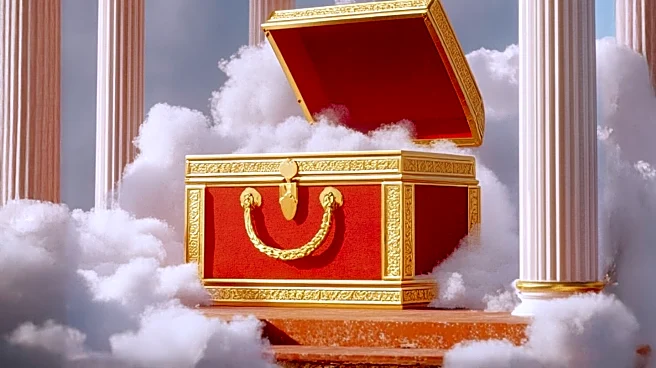What's Happening?
Pandora, crafted by the gods as the first mortal woman, was given a jar containing all the world's evils. Despite warnings, her curiosity led her to open the jar, releasing these evils into the world, with only hope remaining inside. This myth, rooted
in Greek mythology, serves as a narrative explaining the origin of human suffering. Pandora's creation was a direct response to Prometheus's theft of fire, intended as a punishment for humanity. The story has been depicted in various forms of ancient art, emphasizing its cultural significance.
Why It's Important?
Pandora's myth is crucial in understanding ancient Greek beliefs about the human condition and the role of women. It reflects the patriarchal views of the time, portraying women as sources of trouble. The myth also explores themes of curiosity and its consequences, highlighting the balance between knowledge and responsibility. In modern interpretations, Pandora's story is seen as a metaphor for the complexities of human existence, offering insights into the nature of suffering and the enduring presence of hope.
What's Next?
The myth of Pandora continues to be analyzed and reinterpreted, with scholars exploring its implications for gender roles and societal norms. Feminist perspectives have challenged traditional interpretations, viewing Pandora as a symbol of defiance against oppressive authority. The story also serves as a cautionary tale for contemporary issues, such as technological advancements and their potential risks. As society navigates the challenges of curiosity and innovation, Pandora's myth remains relevant, offering lessons on the importance of foresight and ethical responsibility.
Beyond the Headlines
Beyond its immediate narrative, Pandora's myth delves into deeper themes of human nature and the ethical dimensions of curiosity. It highlights the responsibilities that come with knowledge and the potential consequences of unchecked curiosity. The story suggests that life is a balance of good and bad, and it is our task to navigate these dualities with wisdom and hope. In the modern context, Pandora's box serves as a metaphor for the potential risks and rewards of innovation, urging caution and foresight in the pursuit of progress.















